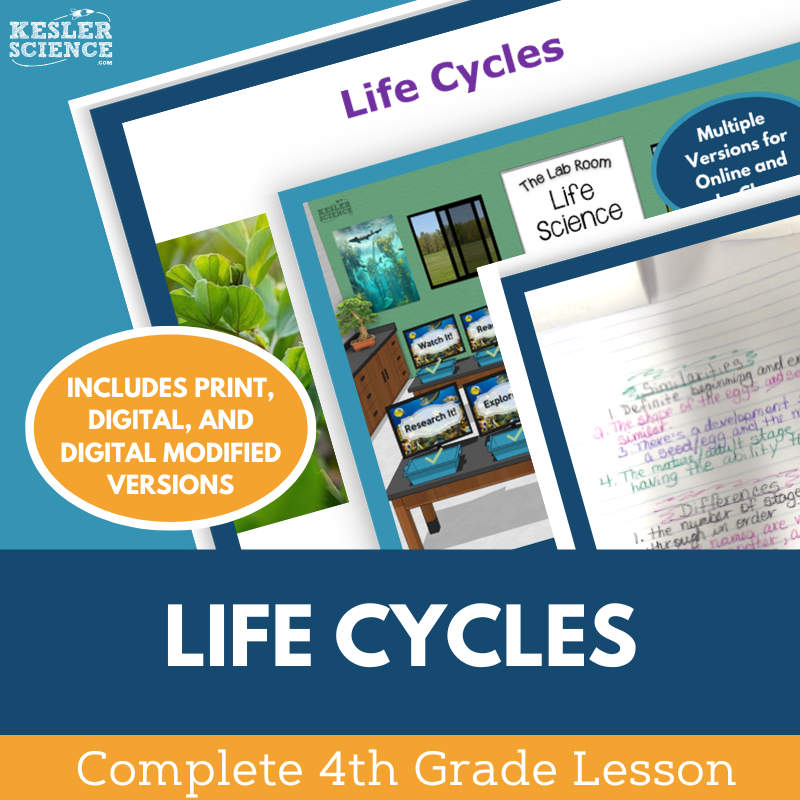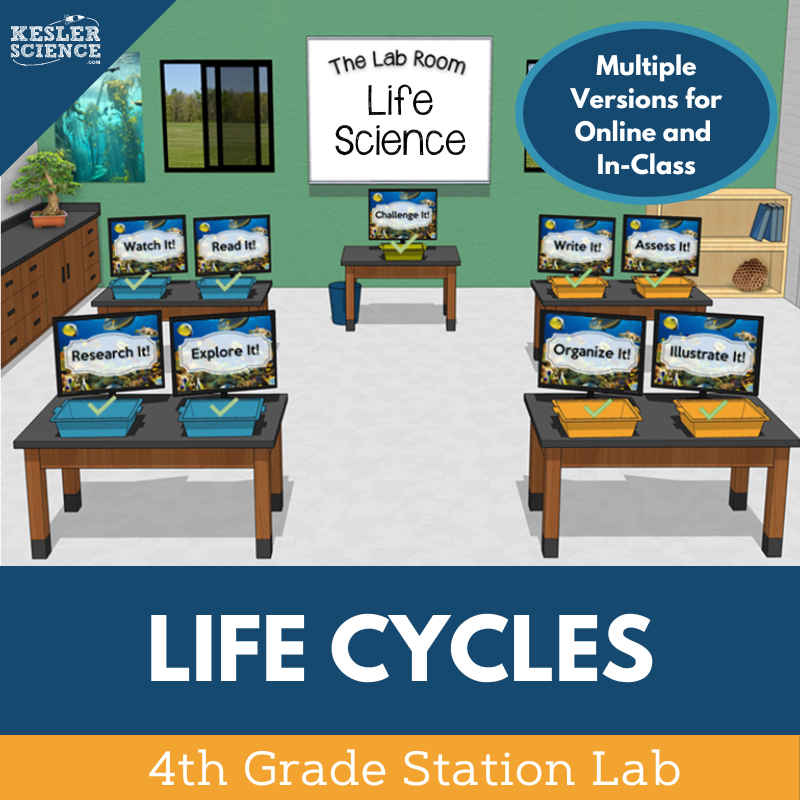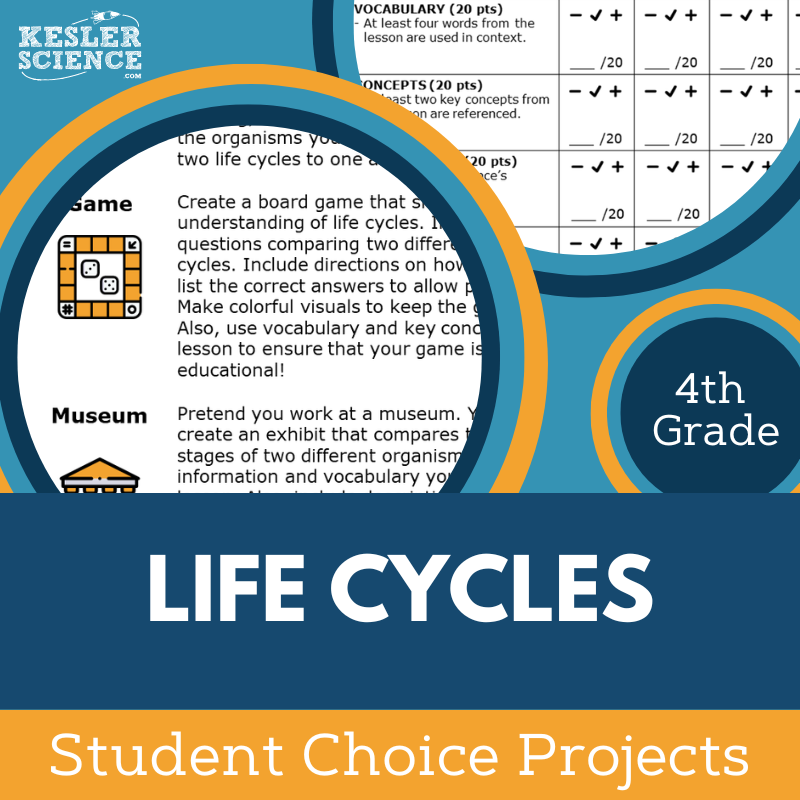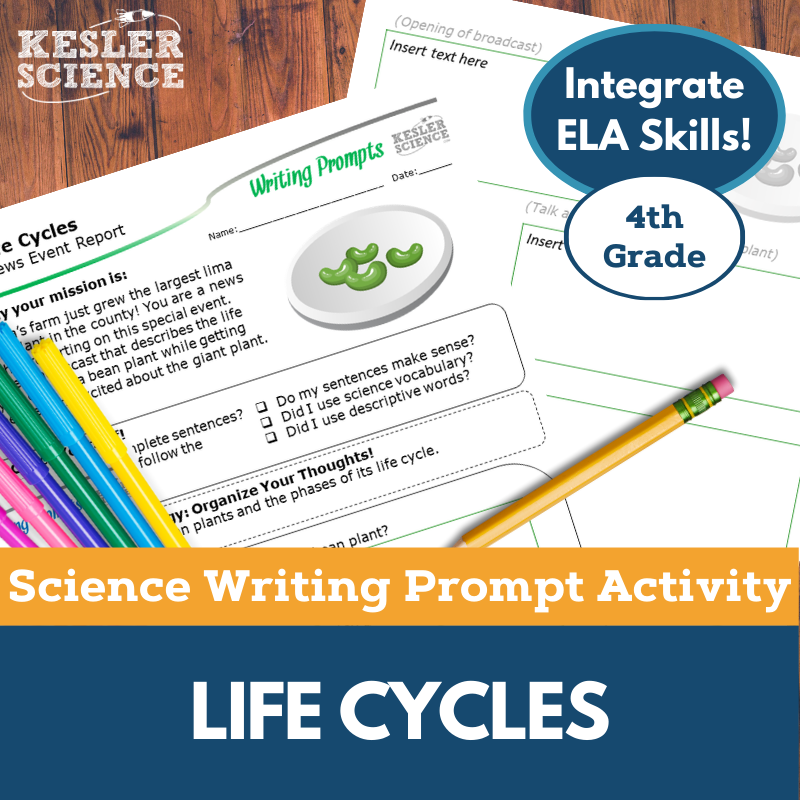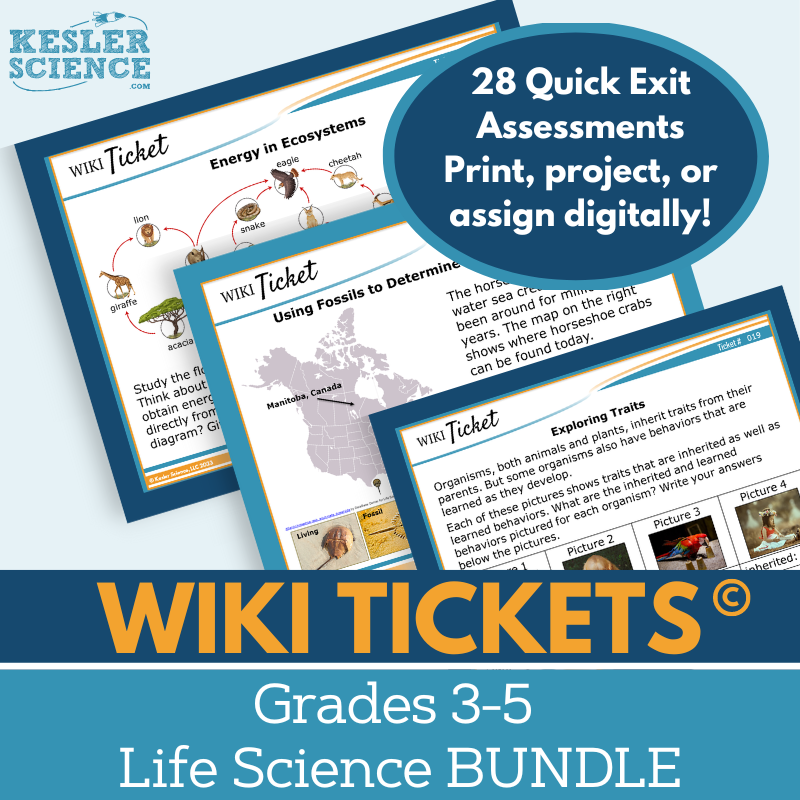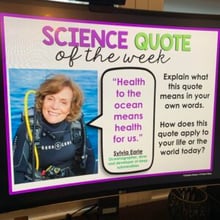Life Cycles Activities for 4th Grade Science
The Kesler Science Life Cycles resources for 4th grade offer an engaging, student-centered approach to understanding life cycles across a variety of organisms. The resources below will give students a comprehensive understanding of life cycles. All of the following materials are also included in the Kesler Science Membership.
Transform lesson planning into a breeze with the Kesler Science Life Cycles 4th Grade Complete 5E Lesson! Packed with everything you need for an engaging, multi-day unit, this resource minimizes prep time and maximizes student-driven learning, helping your students succeed.
Students will explore essential life cycle questions, such as how organisms change throughout their cycles and what stages plants and insects start with. The lesson integrates differentiated materials, multimodal learning options, and flexible formats, including printable, digital, and Spanish translations, so you can cater to diverse learning needs.
The lesson follows the 5E Model (Engagement, Exploration, Explanation, Elaboration, and Evaluation) to ensure comprehensive understanding. From engaging word walls and activities in the engagement phase to student-led stations that cover exploration and output, your students will interact with content through reading, research, videos, and hands-on experiments. A bonus challenge station provides extension activities for early finishers, while editable PowerPoints and interactive notebook templates support explanation and elaboration.
Transform lesson planning into a breeze with the Kesler Science Life Cycles 4th Grade Complete 5E Lesson! Packed with everything you need for an engaging, multi-day unit, this resource minimizes prep time and maximizes student-driven learning, helping your students succeed.
Students will explore essential life cycle questions, such as how organisms change throughout their cycles and what stages plants and insects start with. The lesson integrates differentiated materials, multimodal learning options, and flexible formats, including printable, digital, and Spanish translations, so you can cater to diverse learning needs.
The lesson follows the 5E Model (Engagement, Exploration, Explanation, Elaboration, and Evaluation) to ensure comprehensive understanding. From engaging word walls and activities in the engagement phase to student-led stations that cover exploration and output, your students will interact with content through reading, research, videos, and hands-on experiments. A bonus challenge station provides extension activities for early finishers, while editable PowerPoints and interactive notebook templates support explanation and elaboration.
The Kesler Science Life Cycles Station Lab provides a dynamic, student-led learning experience for 4th grade students, allowing them to explore and compare life cycles in various organisms like beetles, crickets, and lima beans. With eight differentiated activities and a challenge station for early finishers, this modular lab fosters independent learning while saving teachers prep time.
Students can engage with a range of input stations, including hands-on experiments, reading and research tasks, and multimedia resources like videos and websites. Output stations allow students to organize, illustrate, write, and assess their knowledge, while a bonus challenge station offers creative mini-projects to extend their learning.
Designed for flexibility, these materials can be used both in the classroom and virtually. Teachers will find everything needed to guide students through the learning process, with differentiated resources that support a wide variety of learning needs.
The Kesler Science Life Cycles Station Lab provides a dynamic, student-led learning experience for 4th grade students, allowing them to explore and compare life cycles in various organisms like beetles, crickets, and lima beans. With eight differentiated activities and a challenge station for early finishers, this modular lab fosters independent learning while saving teachers prep time.
Students can engage with a range of input stations, including hands-on experiments, reading and research tasks, and multimedia resources like videos and websites. Output stations allow students to organize, illustrate, write, and assess their knowledge, while a bonus challenge station offers creative mini-projects to extend their learning.
Designed for flexibility, these materials can be used both in the classroom and virtually. Teachers will find everything needed to guide students through the learning process, with differentiated resources that support a wide variety of learning needs.
The Kesler Science Life Cycles Student Choice Projects offer 4th grade students the opportunity to select from six different project options or create their own. With a flexible grading rubric, these projects allow for assessments by teachers, peers, or students themselves. The projects cater to diverse learning styles, ensuring that every student can demonstrate their knowledge in a way that suits them.
Teachers can modify the rubric to fit their grading needs, and the projects are available in both standard and modified versions for differentiation. A variety of multimodal project options allow students to engage creatively and personally with the content, using materials easily found in most classrooms or digital tools.
Included in the resource are nine project options, teacher directions, and editable rubrics that assess vocabulary, concepts, presentation, clarity, and accuracy. Whether using basic supplies or completing projects digitally, these activities encourage independent learning and provide opportunities for remediation or challenge.
The Kesler Science Life Cycles Student Choice Projects offer 4th grade students the opportunity to select from six different project options or create their own. With a flexible grading rubric, these projects allow for assessments by teachers, peers, or students themselves. The projects cater to diverse learning styles, ensuring that every student can demonstrate their knowledge in a way that suits them.
Teachers can modify the rubric to fit their grading needs, and the projects are available in both standard and modified versions for differentiation. A variety of multimodal project options allow students to engage creatively and personally with the content, using materials easily found in most classrooms or digital tools.
Included in the resource are nine project options, teacher directions, and editable rubrics that assess vocabulary, concepts, presentation, clarity, and accuracy. Whether using basic supplies or completing projects digitally, these activities encourage independent learning and provide opportunities for remediation or challenge.
The Kesler Science Life Cycles Science and ELA Integrated Writing Activity invites 4th grade students to explore the fascinating life cycle of a lima bean through a dynamic news event report. Students creatively engage in writing exercises while deepening their scientific understanding. The activity’s design ensures easy adaptation for virtual learning, making it an excellent tool for keeping students engaged both in and outside the classroom.
Aligned to TEKS and NGSS standards, this low-prep, student-centered activity supports a variety of uses: as a pre-test assessment, student choice project, or as extra credit. The writing prompt, complete with teacher directions, rubrics, and both digital and printable options, is perfect for differentiation. With a news report format, students expand their science reasoning while strengthening their writing skills.
Available in multiple formats, including projection versions and editable PowerPoint slides, this resource is versatile for all classroom settings. Whether used for elaboration or as a formative assessment, it helps students connect concepts while allowing room for creative expression.
The Kesler Science Life Cycles Science and ELA Integrated Writing Activity invites 4th grade students to explore the fascinating life cycle of a lima bean through a dynamic news event report. Students creatively engage in writing exercises while deepening their scientific understanding. The activity’s design ensures easy adaptation for virtual learning, making it an excellent tool for keeping students engaged both in and outside the classroom.
Aligned to TEKS and NGSS standards, this low-prep, student-centered activity supports a variety of uses: as a pre-test assessment, student choice project, or as extra credit. The writing prompt, complete with teacher directions, rubrics, and both digital and printable options, is perfect for differentiation. With a news report format, students expand their science reasoning while strengthening their writing skills.
Available in multiple formats, including projection versions and editable PowerPoint slides, this resource is versatile for all classroom settings. Whether used for elaboration or as a formative assessment, it helps students connect concepts while allowing room for creative expression.
The Kesler Science Life Science WIKI Tickets provide fun, easy formative assessments for 3rd–5th grade science. This set includes 28 engaging exit tickets aligned to NGSS and TEKS, covering topics like ecosystems, traits, life cycles, and food webs.
Each topic features five formats: a full-screen display for projection, three printable handout sizes, and an interactive digital version compatible with PowerPoint and Google Slides. A bonus table of contents file ensures easy standard alignment.
WIKI Tickets (“What I Know Is”) serve as exit tickets, bellringers, or quick checks for understanding, making them a flexible tool for both in-person and virtual learning environments.
The Kesler Science Life Science WIKI Tickets provide fun, easy formative assessments for 3rd–5th grade science. This set includes 28 engaging exit tickets aligned to NGSS and TEKS, covering topics like ecosystems, traits, life cycles, and food webs.
Each topic features five formats: a full-screen display for projection, three printable handout sizes, and an interactive digital version compatible with PowerPoint and Google Slides. A bonus table of contents file ensures easy standard alignment.
WIKI Tickets (“What I Know Is”) serve as exit tickets, bellringers, or quick checks for understanding, making them a flexible tool for both in-person and virtual learning environments.
Year-Round Resources
These year-round activities will increase your students' understanding of many middle school science topics. All of these activities are also included in the Kesler Science Membership.
Visual Data & Graphing
You're not alone if your students struggle with understanding graphs, charts, and tables. It's a skill that takes an enormous amount of practice. This resource will help students build a strong foundation in analyzing data and creating their own data visualizations.
Bell Ringers and Warm-Ups
These middle school science bell ringers are an excellent way to engage your students as soon as they walk into your classroom. This comprehensive FULL YEAR resource includes everything you need to start off each science class with an interesting warm-up activity.
Review Board Games
Each game board has been carefully designed to keep students engaged. There are 10 different action spaces on each board and dozens of question cards. All of the actions are related to science concepts and keep the students motivated throughout the game.
Each game is ready to play. Simply print out the board and the cards and let the students enjoy reviewing nine different units.
Essential Questions
Below are the essential questions associated with the lessons and activities included in this unit. This topic is only one of more than 100 middle school science topics included in the Kesler Science Membership.
-
How do organisms change as they go through their life cycles?
-
What stage in the life cycle do plants begin with?
-
What stage in the life cycle do insects begin with?
Kesler Science Membership
Imagine never having to search for another middle school science lesson again. The membership gives you access to ALL of the Kesler Science products in one place (Yes, including everything above).
Say goodbye to long hours of lesson prep.

